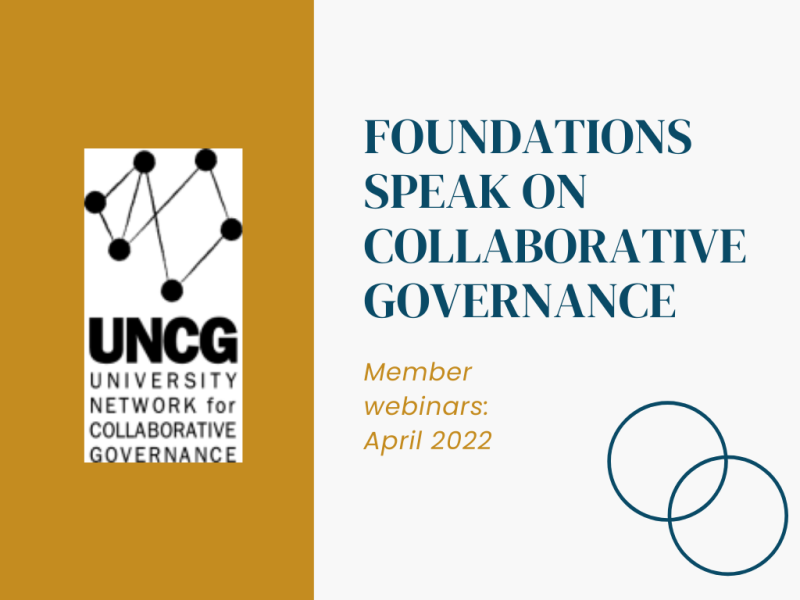
Field Notes by Rebecca Doublesin / Mar 21, 2022
On April 22, 2021, the University Network for Collaborative Governance hosted its first quarterly webinar of the year. The webinar was titled “Foundations Speak on Collaborative Governance.” The online event began with introductions from the guest presenters representing foundations from the states of Oregon, North Carolina, and New Jersey. The speakers each provided a brief summary of their individual organizations, and then participated in a collective question and answer session.
The first guest speaker to present was Whitney Grubbs, the Executive Director of Foundations For a Better Oregon. The organization reflects a collaborative network of five foundations representing some of the largest funders in Oregon. Their collective mission is to create a better Oregon where every child thrives and belongs. The foundation’s key functions include policy, advocacy, convening, data and research, as well as storytelling and narrative. The individual foundations work together to provide support in local communities to better the education of children throughout the state.
The next speaker was James Gore from the Z Smith Reynolds Foundation. The Z Smith Reynolds Foundation is a state-based and statewide foundation. The organization’s goal is to improve the quality of life for all North Carolinians while continuing to unite communities and state culture through celebrating diversity. Gore noted that “communities oftentimes were missing a muscle around coming together.” The foundation’s collaborative problem-solving strategy seeks to bridge the gaps in the missing work at the local level.
Susan Mende spoke next on behalf of the Robert Wood Johnson Foundation. The organization funds a vast array of projects with the goal to build a culture of health. Its mission is to expand health equity and opportunities across the United States for all American citizens. Mende emphasized the foundations focus on the importance of providing for equal opportunities for citizens to live a healthy lifestyle and promote healthy communities.
One of the main questions addressed in the webinar was “How is collaborative governance related to the nature of your work?” Susan Mende suggested that the Robert Wood Johnson Foundation calls upon collaborative efforts to increase community power and the “ability of people to create change through a shared agenda in order to achieve a larger vision.” James Gore added that the Z Smith Reynolds Foundation also focuses on community empowerment through engaging in local communities to hold them accountable. Whitney Grubbs mentioned that collaborative governance efforts for the Foundations for Better Oregon take place through inclusive and participatory action. Grubbs noted that there is a call for collective action and moving as one for effective impact.
Key themes from the webinar surrounding the collaborative nature of foundation work include: placing agency and power in the hands of the people, building capacity for community power, establishing levels of accountability for all those involved, and looking for bridges across sectors to enhance collaborative governance efforts. These themes emphasize the importance of foundations as a connection between stakeholders and local communities. They provide a necessary space for collaborative governance in communities through empowerment and collective action.
Questions from the participants:
1. How does community-based collaborative work connect to formal decision-making and governance processes?
2. Are foundations approaching collaborative action as they did in the pre-pandemic year?
3. How do you work with those who are focused on advocacy and getting things done versus collaboration and people who may slow things down?
4. What are the challenges of local limitations on action?